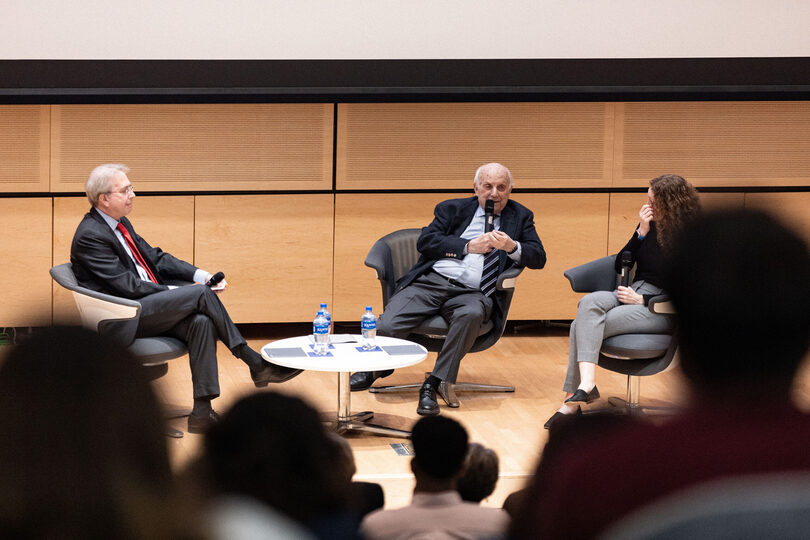‘Speaking Freely’ tells story of Floyd Abrams’ work to protect free speech

Joe Zhao | Assistant Photo Editor
The Tully Center for Free Speech hosts a screening of the film "Floyd Abrams: Speaking Freely” a biopic about the First Amendment. The event featured a Q&A session with guest speakers Floyd Abrams and Clare Smith Marash, the film’s producer.
Get the latest Syracuse news delivered right to your inbox.
Subscribe to our newsletter here.
Members of the Syracuse University community gathered to watch documentary “Speaking Freely,” which centered on the legal work of lawyer Floyd Abrams. The film tells the story of how Abrams paved the way in protecting U.S. citizen’s freedom of speech.
“Do you think there is a time where the First Amendment has gone too far?” an interviewer asked in the film.
“Not yet,” Abrams said.
This exchange concluded “Speaking Freely,” and led into a live Q&A session with Abrams, the film’s producer Clare Smith Marash and professor Roy Gutterman, the director of the Tully Center for Free Speech. The Tully Center hosted the film screening and Q&A in the Joyce Hergenhan Auditorium Tuesday.
The idea for “Speaking Freely” came about during the process of shooting another documentary on hate speech, Marash said. When Marash consulted Abrams before the shoot, she was inspired to create a film about how the First Amendment has always been a topic of discussion in American history.
Abrams, a notable figure in the relationship between journalism and governmental rule, has argued in 13 Supreme Court cases in his career of over 50 years. The film analyzed several of his most notable cases.
The cases included New York Times Company v. United States, where he successfully represented the New York Times in the Pentagon Papers, and the polarizing Citizens United v. Federal Election Commission, where he represented Senator Mitch McConnell, who supported the FEC’s stance of corporations funding political figures without any financial limits.
First-year military visuals student Theopolis Stewart initially attended the screening for a class assignment. Upon his viewing of the film, the event became more than just an assignment, but something he said would stick with him after the event.
“I’m serving in the Navy as a mass communication specialist. A lot of our instructions are very limiting. But as a citizen, outside of being a service member, (the film) gives me a perspective on what my rights actually are and the rights of a journalist,” Stewart said.
Before the start of his career, Abrams was a clerk for Delaware’s District Court Judge in 1961-63. That same year, Abrams joined Cahill Gorden & Reindel, a law firm that has garnered a long-standing reputation of dealing with first amendment cases. By 1970, Abrams became a partner in the firm.
“I am all but old,” said Abrams to an audience member’s question about the future of Cahill Gordon & Reindel. “I’m sort of working (but) not much. The firm certainly is trying to do all that and indeed, they are doing some cases for X.”
The landscape of journalism has shifted from what it once was, according to the documentary. With Abrams and his team advocating for the New York Times’ freedom of press, he has undeniably shaped the future of journalism.
“(Abrams) set a lot of really important precedents in terms of protecting our rights to confidentiality and protecting sources,” said sophomore Danielle Blyn, a dual major in magazine, news, and digital journalism and political science. “The things he’s worked for are really important to pay attention to when you’re learning about journalism.”
Despite the film primarily highlighting Abrams’ journey of becoming a powerhouse in the justice system, Marash said he also cares deeply about the future of the American people.
Through his mentees at his firm, he has made an impact beyond his court cases.
“We interviewed many colleagues of Floyd for this film who didn’t make it into the final cut,” Marash said. “Part of the reason why we put in the small section featuring some of his former mentees was to demonstrate how generous Floyd has been with encouraging the generations to follow.”
Film attendees like Stewart said “Speaking Freely” has become a tool to shape his personal journey.
“I think my favorite part (of the film) is actually just hearing from him how dedicated he is in his craft,” Stewart said.” (He shows that) you could be on the wrong side of or the right side of somebody else’s perspective.”





